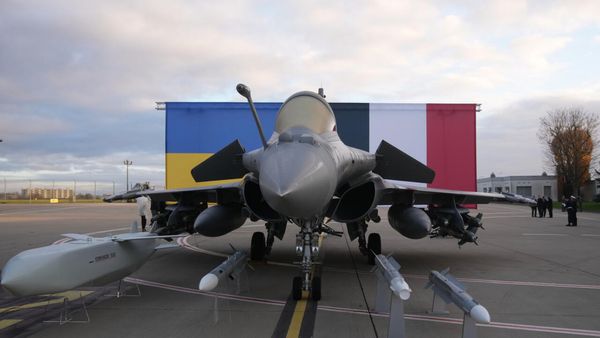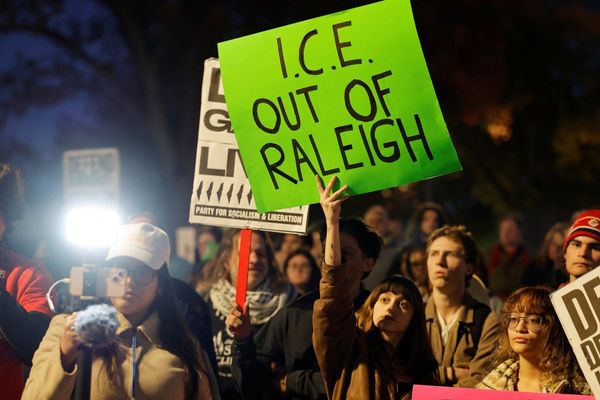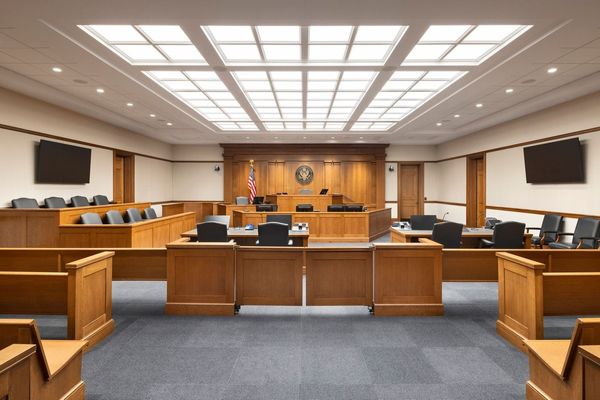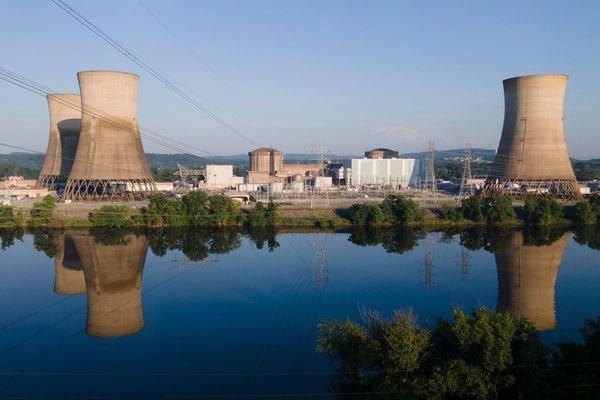
Standing on a truck after a helicopter dash to the tiny airport of Barbuda in the wake of Hurricane Irma, prime minister Gaston Browne addressed the people. He declared all must leave the Caribbean island for their own safety as Hurricanes Jose and Maria were predicted to soon hit. Islanders would be allowed to return “when it was safe”.
It was 2017, and the destruction of Barbuda was reported worldwide to be “catastrophic”, with homes, infrastructure and livelihoods decimated and the inhabitants left in despair.
A state of emergency was declared and the evacuees restricted to the more populous sister island of Antigua for 30 days. Some islanders would never return. Browne said Barbuda was 95% destroyed and estimated it would take up to $300m (£245m) to rebuild.
Within weeks, heavy machinery was at work on the construction site of a private airport for billionaire US investors who had luxury mansions and exclusive hotels already planned.
In 2018, two Barbudans obtained a temporary injunction on the construction of the airport, challenging its impact on the island’s fragile ecosystem. The Antiguan government responded by questioning whether the citizens’ had any legal right to make a challenge. The case reached appeal in 2021 with the focus on the legitimacy of the Barbudans to object to government plans for Barbudan land. In 2022, the court ruled they had no standing – or right.
This week, the UK privy council is expected to make a final judgment over the issue. Antigua and Barbuda achieved independence from the UK in 1981, but remain in the Commonwealth with a constitutional monarchy under Charles III, so the privy council is the final court of appeal. The verdict could impact activists far beyond this tiny island, as a decision against the Barbudans could set a precedent across the Caribbean for citizens challenging governments’ perceived environmental violations.

Barbudans believe Hurricane Irma’s destruction was an opportunity for advancing what has been called the most egregious land grab in the Caribbean, as developers – enabled by politicians’ thirst for foreign direct investment – have sought to turn much of the island into an exclusive resort for billionaires. The Antiguan government denies this and says the land is legally theirs to use as they see fit. “This Government is satisfied that it has attracted the type of investment on Barbuda that will redound to the benefit of our country,” a spokesperson said.
Much of the population of about 1,700, who have mostly returned to Barbuda, has been fighting back against what they claim is an erosion of their communal land rights by stealth legislation, which has exacerbated social and economic disparities, human rights violations and environmental crimes. The UN body on human rights has expressed “deep concerns” over the sprawling resorts.
These Barbudans are determined their island will not become like wealthier Antigua, where high-end hotels and celebrity mansions are strung across its 365 beaches. They were alarmed by Browne’s comment last year that Barbuda should be Jumby Bay – Antigua’s private island resort – “on steriods”.
In September, at the International Tribunal for the Law of the Sea (ITLOS) in Germany, Browne gave a speech calling for “legally binding obligations” on the environment rather than “abandoning peoples to suffering and destruction”.

Later that month he was at the UN in New York, calling for a fossil fuel non-proliferation treaty. In Barbuda, those bringing legal action say his government’s decisions have steamrollered over objections from local people worried their island risks irretrievable ecological damage.
Marine biologist John Mussington is chair of the Barbuda Council’s agriculture and fisheries division. “Barbuda was not uninhabitable after the hurricane. This was furthest from the truth,” he says. “Neither was it 95% ‘destroyed’. The UN development project damage assessment said that it was 95% ‘damaged’. There is a difference between destroyed and damaged.
“The intention was to remove all of us and not allow us to come back to Barbuda. Without a population, redevelopment could happen on a clean slate – terra nullius (territory without a master).” Mussington returned weeks after being forcibly removed.
Communal ownership of land in Barbuda dates from when the Codrington family, leaseholders of the island since 1685, left, compensated with £8,823 under the Slave Compensation Act 1837 for their loss of 411 enslaved people. Those who had been chattels of the Codrington plantation were left to survive however they could and have worked the land for generations. Communal land played a vital role in the way of life, with each Barbudan considered a stakeholder with rights and a say in how land was used.
Barbuda’s pristine landscapes have long drawn visitors, including Princess Diana, after whom an 11-mile pink sand beach is named. The beach, along the western boundary of the Barbuda Lagoon, is just one area under threat, as rising seas and poor land management contribute to the relentless erosion of the sandbar protecting the beach.

The 16-mile (26km) Codrington Lagoon national park (CLNP) is another treasure, encompassing mangrove thickets, expansive seagrass beds and coral reefs. Marine life includes the endangered hawksbill and leatherback turtles. Above the azure waters, the largest gathering of frigate birds in the western hemisphere appears daily.
CLNP is a formidable bulwark against coastal erosion, exemplified during Hurricane Irma, and is protected under the 1971 Ramsar Convention on Wetlands, a treaty signed by nearly 90% of UN member states, including, since 2005, Antigua and Barbuda. But critics claim the agreement is not being upheld.
“Evidence of poor land and marine management can be seen in the many ill-conceived developmental projects in progress across the island,” says Mussington.
“Mangroves in construction zones are being transplanted in the mistaken belief that removal will have no ecological impact. Sand dune vegetation, nature’s hurricane soil defence, is being removed to facilitate hotels, golf courses and mansions. Approved by the government, these projects have altered the coastal dynamics on the island, already severely damaged by decades of sand mining,” he says.
“Changes in water chemistry in the lagoon have disrupted ecosystems, threatening both the natural beauty of our island and the livelihoods of inhabitants.”
Mussington is among those who allege that the Antigua and Barbudan government saw Hurricane Irma as an opportunity. They were suspicious of how slow the authorities were to reconnect water and electricity to the islanders, and convinced there was a desire to stop Barbudans returning.

It is “disaster capitalism”, says Mussington. “The prime minister also estimated $250m to $300m was needed in aid before any assessment was made by the UN.
“Until now, one of the main things we kept trying to get from the government was an independently audited account of all goods, services, materials, finances that were sent in name of Hurricane Irma relief. We have never received such an account,” he says.
“The Indian government gave a grant of $1m for the ‘resilient restoration of pivotal public infrastructure’. The government made the decision, before anything else was done to fix the hospital or school, that they were going to use some of this money to repair the post office. So we got the post office repaired before the health facility.”
Mussington says Barbudans’ land rights have been eroded for decades. “It started escalating in 1976 with the Local Government Act. The Antiguan administration began to realise the potential of Barbuda. Around that time the sand mining enterprise started, and they began to see the wealth that can be extracted and the speculation with [land] leases then started,” he says.
The Barbuda Land Act of 2007, enacted by Baldwin Spencer’s United Progressive party (UPP) government, was seen as historic legislation to protect people’s rights and communal land ownership.
But, perversely, enshrining land rights in written law left them vulnerable to amendments. In 2016, the Browne government dissolved the Barbuda Land Act. Trevor Walker, a Barbudan MP, told the Antigua Observer dissolving it had been “an unforgivable sin”.
In its place emerged a law allowing privatisation of land without consent of the Barbudan Community Council, fuelling mistrust between the central government in Antigua and the Barbudan people, who were then required to apply for titles to land they were already occupying.
Barbuda’s national parks manager, Kelly Burton, says: “The Local Government Act is entrenched in the constitution, and that was where the Land Act was formed from. That [Local Government Act] was not repealed because they cannot change the constitution without a two-thirds majority.
“So, instead they went right ahead and repealed the Land Act, and they did what they wanted to do, selling off land in Barbuda.
“Normally, you wouldn’t get land unless you purchase an existing lease. You first have to go to the Barbuda Council, which is the authority, with a letter of intent. A town hall meeting follows, where a majority vote is needed. The plan then goes to parliament. If they agree, it goes for cabinet approval and is then signed by the British governor general, that’s the process. A lot of these leases that they [developers] receive do not go through that process.”

In 2017, say Barbudans, Hurricane Irma provided the opportunity to move on the “deracinated imbeciles”, as Browne has called those who oppose the developments and who have called for any tourism projects to be low-impact and sustainable.
Browne has decried communal land ownership as akin to “welfare” and says he wants an end to “nonsensical arguments about [land] ownership and ownership in common and so on”. He said: “We’re making it abundantly clear to all citizens, all residents, that we have a single registered Land Act that will govern how we dispose, how we lease, how we deal with land in Antigua and Barbuda.”
Jackie Frank, a former chair of the Barbuda Council, whose father was an MP on the committee that devised the original Land Act, believes the government wants a Barbuda for billionaires. “To join that club you need a private jet,” she says. “This leaves little room for Barbudans. Barbuda is a neglected place. If we accept what’s being done, we don’t just lose the land, we could be removed as a people.”
Browne points to the fact that Barbudans were unable to insure their homes before Hurricane Irma because they had no deeds, he says the Land Act changes are empowering.
Mussington is unconvinced: “Browne made the statement that any aid received was not for fixing homes but to fix public buildings, so he was telling people, apply for that title deed, get it and go to the bank and borrow money to fix your house.”
Pointing to a derelict building, he says: “That was the police headquarters, the seat of law and order on the island, a public building, and that remains just how the hurricane left it. So what was the priority?”

Many beaches, including Princess Diana Beach, are now restricted to local people. Gulliver Johnson, a local activist, says: “This is the growing situation on the island, as access to more beaches continues to be restricted with heavy patrolling by security guards and constant monitoring by security cameras to ward off any trespassing Barbudan citizens.
“I don’t mind being a servant or cleaner if I have a share in the land, but don’t come here, take my land and then offer me a job to clean your hotel. It is soon going to become apartheid here, where we need a pass to go where the foreigners occupy.”
Alliances between developers and the government are a key bone of contention for Barbudans, who claim cronyism in the relationships with foreign celebrity investors who are given honorary titles.

US billionaire John Paul DeJoria – the founder of Paul Mitchell hair products and Patrón tequila – has been appointed ambassador-at-large for Antigua. His Peace, Love and Happiness (PLH) project is developing the large Barbuda Ocean Club with partners JB Turbidy, whose FireSky Ventures is part of the Christophe Harbour luxury resort on St Kitts, and Steve Adelson, whose Discovery Land Company helped develop the similar Baker’s Bay resort in the Bahamas.
The Barbuda Ocean Club encompasses two ecologically critical areas, Palmetto Point and Coco Point. Palmetto Point will boast 400 luxury villas to be sold for up to $10m; an 18-hole golf course; a beach club; a farm and family park and a social club. About 600 acres (240 hectares) have been delineated. Coco Point is partly operational and fishers have complained their access to the sea has been blocked with “No Trespass” signs.
Robert De Niro, co-owner of developers Paradise Found, which has long occupied the site of disused hotel the K-Club, was named special economic envoy for Antigua by Browne in 2015. This development was briefly stalled by a court challenge to the constitutional legitimacy of the “Paradise Found (Act) 2015” legislation that overturned previous requirements for developers to consult locally.
Trevor Walker and Mackenzie Frank of the Barbuda Council lost the challenge when the privy council ruled they could not demonstrate a documentary interest in the communal property.

De Niro was unable to be reached for comment but asked by CNN in 2018 about his Barbuda development, he said the goal was to help the island get back running after Hurricane Irma. “The most important thing [is putting] the people first and then the hotel. Those things can be done simultaneously, but it’s a big endeavour,” he said.
The airstrip subject to this week’s privy council hearing is being built by the Discovery Land Company.
The challenge is backed by the Global Legal Action Network (Glan), a British NGO which has supported islanders’ legal fights since 2019.
“The misleading narratives, the forced transfer of native Barbudans after the hurricane, and layers upon layers of questionable conduct, dealings, leases, legislation and political pressures, all raise questions about the integrity and legitimacy of some of these dealings,” says Glan’s founding director, Gearóid Ó Cuinn.

One of the activists’ main complaints has been the lack of due process, from proposals and approvals to the construction of several multimillion-dollar developments without the consent of the Barbuda Council. But communications between developers and Barbudans have deteriorated, with meetings boycotted by activists.
Glan, who supported 22 people arrested after a protest at the Palmetto Point development before charges were dropped in 2022 , has complained about the harm to the island’s wetlands to the Ramsar Secretariat in 2020 and again in 2022. The group says that to date the secretariat has not indicated what, if any, action it will take. But the Antiguan government’s own Development Control Authority (DCA) has expressed concerns over Ramsar infractions. The DCA falls under the minister for land and urban renewal who is Maria Bird-Browne, the prime minister’s wife.

Browne has sent his own message to any future protesters. “(I) want to make it abundantly clear that those who may intend to become economic terrorists in this country, to block investment and retard the progress of the people of this country, to keep our people unemployed, they would have to face the full extent of the law for any infractions whatsoever,” he said.
The Antigua and Barbuda government deny any allegation they have acted unfairly or outside due process. A spokesperson says permission for development did not solely rest with the prime minister but rather the DCA.
“The Browne administration has not authorised any development that is contrary to the Laws of the State or that compromises ‘historical land rights and the environment’,” he says.
“I absolutely, vehemently and unequivocally, deny that there was any land grab; or delays in the reconnection of water and electricity in the aftermath of Hurricane Irma; or partnership or fraudulent action to raise money to partner with investors for projects on Barbuda or at all; or lack of consultation or violation of the Ramsar Convention; or questionable conduct in regards to following the due processes of leases or environmental impact assessments; or any conflict of interest and that a desire for foreign investment led to a breach of our laws.”
Many Barbudans are not satisfied. Mussington and Johnson claim environmental damage to the island will soon be irretrievable and money is simply going towards constructing a foreign-owned asset that may drain the country.
As they wait for yet another court ruling, the years of fighting have divided Barbudans.
With the flow of trucks and heavy machinery, the island’s unpaved roads have become dustbowls and potholes have become craters. The layer of dirt that coats the homes in Codrington village, and the shrinking mangroves and seagrass beds are constant reminders to defiant islanders of the battle they refuse to accept as lost.
In a statement to the Guardian, PLH said the Barbuda Ocean Club was a “regional model for sustainable development” that had “significantly improved the environment, infrastructure, quality of life and economic opportunities for the residents – our neighbours, friends and co-workers – on the Island.”
PLH claims to have “reversed 40 years of neglect” on the island and says it entered into legally compliant lease agreements with the Antigua and Barbuda government and the Barbuda Council in February 2017, “following a fully transparent and inclusive process”.
The spokesperson says PLH had invested tens of millions of US dollars into Barbuda and environmental initiatives have been launched.
“We have additional environmental restoration projects currently in the research and design stage that we hope to launch in 2024. All of this is done in consultation and cooperation with Antigua and Barbuda’s ministry of environment, respected environmental experts, and local residents who are employed by our monitoring initiatives.”







